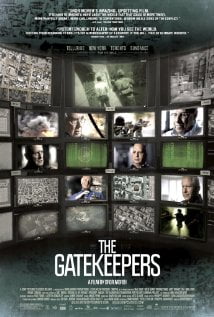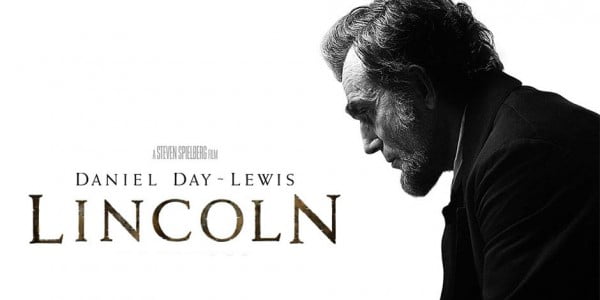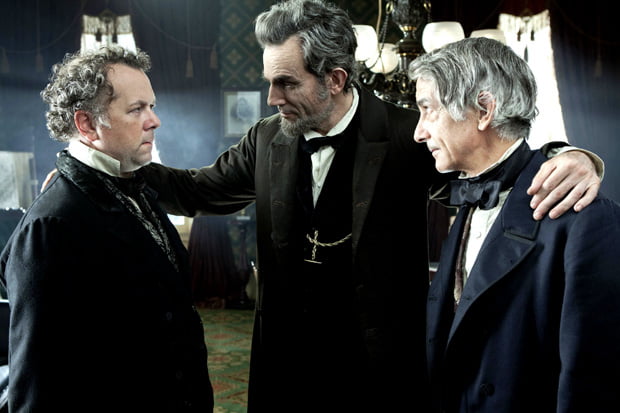I'm always on a quest to find God in places that are outside the church. Spirituality can happen anywhere, I feel-- in conversations over coffee, while listening to music or even at the theater. We just have to have our eyes open!
 I love watching and going to the movies. Even besides the excuse to eat more popcorn (my favorite), particularly good films especially the artsy kind have the ability I feel to shape my conscience and expand my worldview like nothing else can.
I love watching and going to the movies. Even besides the excuse to eat more popcorn (my favorite), particularly good films especially the artsy kind have the ability I feel to shape my conscience and expand my worldview like nothing else can.
In light of this, recently, I've found myself making a mental list of the top five films I've seen in the last few years that have the possibilities for great faith discussions. Here's my top picks and a bit on how they got me thinking--
1. The Soloist (2009) When we believe in transformational community and doing life together, it is easy to fall into the trap wanting to "fix" people. We believe a person's life could improve if they could just do x, y, and z. But, The Soloist provides a unique message not only on how friendship can be one of the most important acts within the kingdom of God, but how complicated mental illness, homelessness and systems of social services can be. There are no easy answers but faithful friendship is a start. (Topic: Faith and Friendship)
2. Chocolat (2000) Life together is messy. Those who we think are "the religious ones" are often the most sick. Those who we think are the most lost are often the most found. Staying in one place, planting roots and being in relationships with others for the long haul is counterintuitive to our transit society. But, as we stick around and begin to learn from one another, what we find is that the pleasure of community life is sweeter than we could have ever imagined! (Topic: Faith and Community Life)
3. Moneyball (2011) There is the old way of doing things. There is the new way of doing things. How easy is it to think that they old way has nothing to speak to the new way. Leadership is doing the tricky balance of helping bring people along and create a new vision with respect for what has always been. Transformational leadership can be costly, especially to your family life. But, when tough choices are made and the right people are put in place, old institutions can be more amazing than we ever imagined. (Topic: Faith and Leadership)
4. Philomena (2013) Our paths to wholeness are often so broken that we feel beyond repair. The twists and turns of our lives lead us to wide open spaces of regrets, grief and shame. But, this is the mystery: grace is present even still. And it is grace-- as we lean into it-- that enables us to become the unthinkable: a forgiving people. And when forgiveness happens, it is like a dance that brings beauty to our lives even in our most rough edges. (Topic: Faith and Forgiveness)
5. The Way (2010) Healing is often about making the first step out of bed and then the next. And when we make such steps, guideposts of all sorts will often show up to help. Guideposts can look a lot like the gift of conversation over a good bottle of wine, the company of strangers, and strength for the next day. We all have deep pain, though some of our pain is more visible than others. And it is in facing our pain and the journey it takes us on, we find rest for our souls. Healing work is intense work, though so should not be entered into lightly. Who knows who we will become as we move? (Topic: Faith and Grief)
What others might you add to this list?
 I love independent theaters. I love films that may or may not get press or bring filmmakers lots of money, but present a message through their art medium that make you think. I love films that stir up conversation long after the credits roll.
I love independent theaters. I love films that may or may not get press or bring filmmakers lots of money, but present a message through their art medium that make you think. I love films that stir up conversation long after the credits roll.
For me one such film I recently watched in the documentary called Gatekeepers. While nominated for an Oscar, winning a Cinema for Peace honor and getting rave reviews from the critics, I'd never heard of it until I was browsing the options for a movie night.
I read the description: "A documentary featuring interviews with all surviving former heads of Shin Bet, the Israeli security agency whose activities and membership are closely held state secrets" and was immediately intrigued.
Maybe this just sounds to you like a nerdy way to spend a night out (and I fully admit here my nerdy status), but in actuality my interested piqued from the fact I spent 10 days in Israel alongside a Inman, a Rabbi, and evangelical pastor in 2011.
It was a trip that brought my mind and spirit to the center of the crisis of the Middle East in ways that just don't leave your heart when you return home.
We called our trip a "delegation of peace." And though it is usually every pastor's dream to take a tour to the Holy Land at some juncture in their ministry (and I was one of them)-- this was not your normal journey to the Holy Land.
We traveled to intentionally together to explore the conflict between the Palestinians and the Israelis in the eyes of one another. We wanted to explore the sights important to each of our religious traditions, as children of Abraham, with an openness to learn without our natural biases. We sought to meet with peacemakers on the ground on both sides. And, we wanted our congregations/ places of worship to grow in friendship with one another when we returned home.
Throughout the journey, I came to believe there is no better way to see Israel and the Palestinian territories than with an Rabbi and Iman by your side.
For the Holy Land is more than about the life and work of Jesus, as many Christians bulldoze their way into the country in big tour buses-- it's the center of history our friends in the Jewish and Islamic tradition as well, meant to be respected and honored.
Now, I can't imagine going back to Israel any other way or a conversation about the region without consideration for the perspective of both Israel and their Palestinian neighbors.
I loved that Gatekeepers took me back to this place of learning and reflection on the complexity of history, politics and ideology that shapes the current state of affairs in Israel today.
I appreciated that Gatekeepers showed the humanity-- both the good and not so good-- of the Shin Bet, Israel's security agency. Sometimes the best decisions that could have been made at the time occurred-- and sadly innocent people died anyway. Sometimes poor choices in security cost hundreds their lives (and livelihood). Sometimes top Shin Bet official wept for lives lost and also wished for a better way of relationships between neighbors (as much as they were/ are labeled the "bad guys").
I appreciated the commentary on religious leadership within the region-- highlighting the crucial role such leaders play in persuading the hearts and minds of people, for good or evil.
I appreciated the fact that the film ended without a political message of either pro or against Palestinian statehood and/ or a new Middle East peace agreement BUT with the statement that peace will come through friendship. It's not the message I expected-- to be pro greater military occupation or even different new political leaders. But, simply friendship. Peace through friendship.
Go out and see Gatekeepers with a friend! You'll be glad you did.
By the way, our group blogged our way through the journey, if you are interested in more specific reflections check out our trip website hosted by George Mason University).
 If you haven't seen Daniel Day-Lewis' Oscar winning portrayal of Abraham Lincoln this season, I highly recommend it.
If you haven't seen Daniel Day-Lewis' Oscar winning portrayal of Abraham Lincoln this season, I highly recommend it.
What I love about this film, as many critics have said, is its humanization of Lincoln. Not only do you see his vocational struggles to lead the country during a turbulent time of war, but you see his difficult marriage, his parenting successes and failures, his erratic sleep patterns, his depression and most of all his perseverance.
One of the most striking aspects of film, in my opinion, came every time Lincoln told a story. Lincoln defused tense or a fear-driven moment with a tale: a tale would usher into a room clarity and grace. Or sometimes just more frustration! I laughed aloud on several occasions when one of his colleagues complained, "Oh, not another one of your stories." I could imagine this kind of complainant coming from me if I were there!
To his literal-minded critics, it seemed that Lincoln's use of stories were somehow a diversion tactic or simply a waste of time.
But, if Lincoln's bystanders listened closely they'd hear a nugget of wisdom for the challenges at hand. Stories, at least as this film portrayed, became a tool for abstract thinking, re-consideration of engrained opinions, and humor. All things difficult conversations needed to keep moving forward.
Most of all, Lincoln's use of stories helped everyone get on the same page. Or at least start asking the right questions.
 Thinking about how Lincoln's stories became the balm to hold his family, critics and even the nation together-- has helped me to see Jesus' steps with greater clarity.
Thinking about how Lincoln's stories became the balm to hold his family, critics and even the nation together-- has helped me to see Jesus' steps with greater clarity.
During Lent this year, I've been reading through a portion of Luke's gospel every day. It's been a long time, I have to say, since I've read a gospel straight through without any intention of preaching or teaching what I'm studying (what a refreshing change!).
Like Lincoln, Jesus used parables regularly to enlarge listeners' worldview, to re-shape their vision of God, and to abolish religious practice out of touch the good news for all people.
The Parable of the Lost Son is one such story that I know my lectionary preaching friends are wresting with this week-- one of those stories Jesus told that it is hard to preach out of such great familiarity!
But, like many who will hear sermons on this story this Sunday, Jesus' audience also struggled. "Couldn't you just get on with it?" many must have complained. For scripture tells us that these parables often fell on confused and frustrated ears. But this did not change Jesus' approach. He kept telling stories anyway.
I don't think Jesus' teaching would be the rich feast we find it to be today without his stories. The parables give show us God's vastness like nothing else could.
Yet, even with this true. I, like those first disciples and the crowd gathered around Jesus, often feel confused at Jesus' parables, especially those in whom I've heard countless times before. It's so easy to think the stories are simple (hey, I've got this) only to find that they're completely more complex than I ever imagined them to be.
But, the stories draw me in every time. They mesmerize me in fact. I'm glad they are there-- even if I would like to say to Jesus sometimes, "just skip the stories and make it plain."
Thank goodness for the storytellers who keep sharing. Maybe one day we'll all understand.